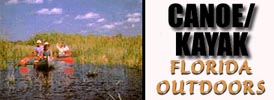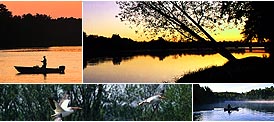
Tides | Where to Canoe/Kayak | Instruction | FAQ


Rules to Remember
Wildlife
Do not approach or harass alligators and crocodiles, as they can be dangerous. It is illegal to feed wildlife. Backcountry sites are shared with alligators, marine turtles, nesting birds and other wildlife. Please observe, but do not disturb.
Protected Resources
All plants, animals, and artifacts are protected; do not collect or disturb them. Do not cut mangroves and other vegetation in any manner. Unoccupied shells may be gathered, up to one quart per person.
Pets
Pets are not permitted at backcountry campsites, beaches, or ashore anywhere in the backcountry. Pets can disrupt feeding, nesting, and mating activities of wildlife.
Your Vessel
All vessels must conform to Coast Guard regulations. Obey all posted signs regarding closures, no wake zones, etc. Manatee areas are posted; use caution and travel at idle speed.
Portable Motors
Operation of generators, chain saws and other portable motors is prohibited at wilderness sites.
Fires
Ground fires are not permitted at ground sites and chickees. Ground fires are only allowed at beach sites (except islands in Florida Bay), where they must be below the average high tide line. Use dead and down wood only! Backpacking stoves are recommended, as wood is often wet. Clean up after fires.
Weapons
Possession of weapons is prohibited. Contact a park ranger for details.
Closed Areas
All keys (islands) in Florida Bay are closed to landing, except Bradley Key (open sunrise to sunset) and those designated as campsites. In Florida Bay, the mainland from Terrapin Point to U.S. 1 is closed to landing.
Sleeping on Your Boat
If you sleep aboard a vessel in the wilderness, anchor out of sight of chickees and 1/4 mile from other occupied sites.
Fishing Regulations
State fishing licenses in fresh and salt water are required, and species and size requirements are enforced.
Food
Do not leave food unattended. Store food in a secure compartment aboard a vessel or in a hard-sided cooler (not foam). Raccoons are aggressive and may chew through plastic jugs containing fresh water. Raccoons will also tear into to tent to obtain food. Take food and water for one extra day.
Trash
Bring all trash out of the backcountry with you. Do not bury it or dispose of it in toilets. Use toilets where provided, for human waste only. International laws prohibit dumping trash at sea.
Minimum Impact
Much of Everglades National Park is designated wilderness (with the exception of the water surface). Wilderness ethics dictate that visitors to the area try to leave no trace of their passage. Some suggestions for minimum impact use include:
Watch Your Speed!
Powerboaters should reduce speed in narrow channels. They should idle past canoeists and avoid approaching canoeists too closely. Vessels within 100 yards (90 m) of any backcountry campsite need to approach sites at idle speed to avoid prop dredging and excessive wave action. Watch for manatees!
Human Waste
Use toilets where provided. Bring a small plastic trowel for use at other times. Where there is no toilet, dig a hole at least six inches deep and cover it after use or, better yet, pack human waste and toilet paper to the nearest toilet. At beach and coastal ground sites, urinate directly in the water. To avoid soap pollution in local waters, wash dishes (and yourself) away from waterways and sprinkle the graywater over the ground to soak in.
Keeping Wildlife Wild
Do not approach wildlife so closely that it interrupts their natural behavior. Enjoy the diverse wildlife - but from a safe distance. Do not feed any wildlife.
Maintain the Solitude
Quiet hours are in effect from 10 p.m. to 6 a.m. Please show mutual respect to other wilderness visitors.
For Your Safety
Important Supplies
Carry fresh water (1 gallon / 4 liters per person per day), compass, nautical charts, anchor, sunscreen, sunglasses, rain gear, insect repellent, and tent (with insect netting).
Encountering Motorboats
Canoeists will encounter motorboats. Angle into the wake of a boat to minimize the chance of overturning.
If You Are in Trouble....
Stay with your vessel near a navigational marker or campsite. Set anchor immediately. Try to attract the attention of other boaters. The Gulf Coast Ranger Station and the Flamingo Ranger Station both monitor radio Channel 16 during daylight hours. Please use this channel for emergencies. The U.S. Coast Guard monitors the radio 24 hours per day.
Tides
Beware of swift currents and tides when securing vessels overnight; tidal ranges can exceed 4 feet (1.2 m) in some locations. Beach canoes above high tide line or anchor from three points at landings/docks. Tides can also be used to your advantage in travel. Tide tables are available at the Flamingo and Gulf Coast Visitor Centers.
Winds and Weather
Numerous canoes and boats have been swamped by rough seas on windy days. Thunderstorms occur frequently in summer. Hurricane season is June through November. Prepare for sudden wind and weather changes at any time. Anchor or tie your boat securely.












